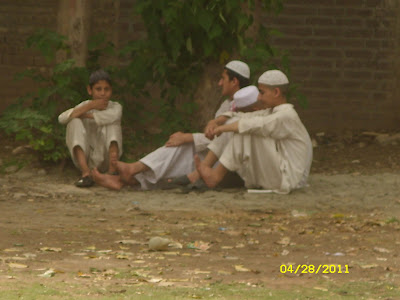Talibs Enjoying their Game in Early Hours
By: Haroon Baloch
After signing in my office on bright and sunny morning of Islamabad in spring 2011, while having my breakfast at "Dhaba" behind the posterior boundary of my office, it was amazing to see these young chaps playing cricket in a vacant plot of CDA (Capital Development Authority). All of a sudden I thought how to convey my foreign media fellows, can such little Talibs be threat to world's peace? Who is responsible for damaging Pakistan's image?
By: Haroon Baloch
After signing in my office on bright and sunny morning of Islamabad in spring 2011, while having my breakfast at "Dhaba" behind the posterior boundary of my office, it was amazing to see these young chaps playing cricket in a vacant plot of CDA (Capital Development Authority). All of a sudden I thought how to convey my foreign media fellows, can such little Talibs be threat to world's peace? Who is responsible for damaging Pakistan's image?
 |
| ISLAMABAD, April 29: Talibs enjoying their early hours of morning at 'Dhabba". |
 |
| ISLAMABAD, April 29: Talibs, gathering in field outside Madrassah after their morning lesson. |
 |
| ISLAMABAD, April 29: Two teams of Talibs playing cricket. |
 |
| ISLAMABAD, April 29: A few of them while waiting their turn to bat. |
 |
| ISLAMABAD, April 29: One of the mates is ready to pull a shot for a boundary. |
 |
| ISLAMABAD, April 29: While taking run after bangging the ball |
 |
| ISLAMABAD, April 29: Another mate trying hard to get his wicket |
 |
| ISLAMABAD, April 29: While strategizing their innings during over break. |
 |
| ISLAMABAD, April 29: While bowling from his end. |
 |
| ISLAMABAD, April 29: Hurrah! he takes his wicket, celebrating victory. |
Wonderful story!
ReplyDeleteMatthews
Good
ReplyDeleteKala Bagh